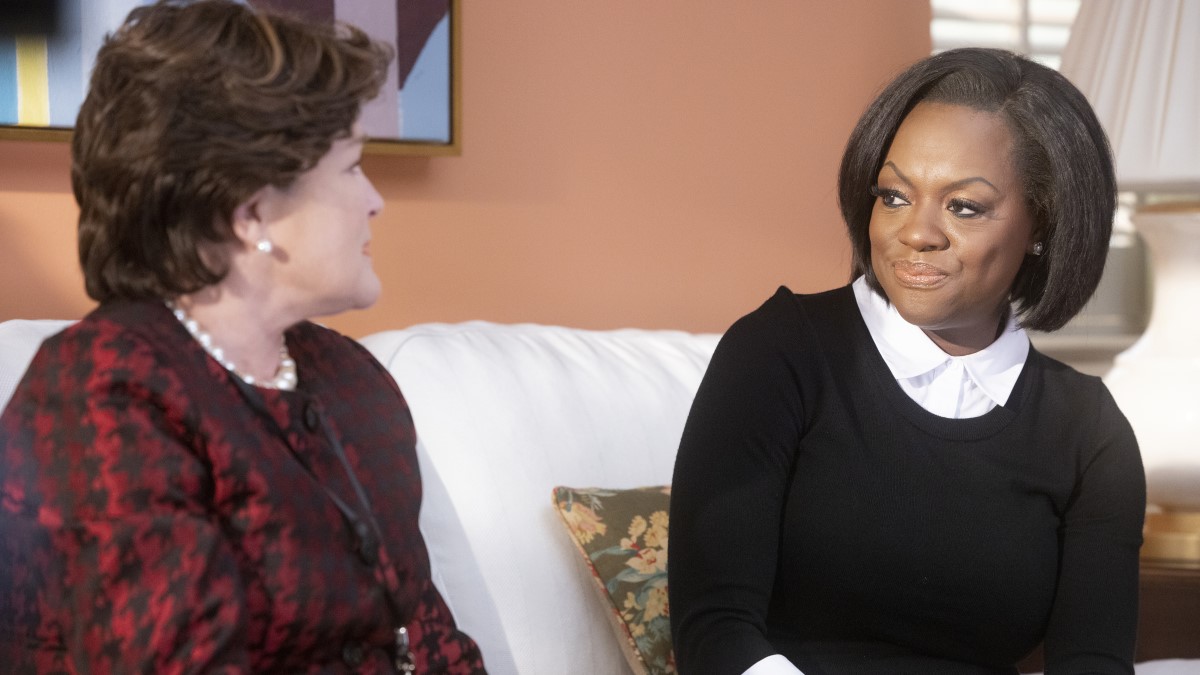What to Watch Verdict
Some of the storytelling framework frustrations remain, but this is the most impactful and effective episode so far.
Pros
- +
Michelle Pfeiffer's range
- +
Director Susanne Bier captures intimacy and vulnerability
- +
The female friendship thread
- +
Hits on the importance of a personal connection
Cons
- -
There are still disjointed moments
- -
Unsubtle underscoring of some themes
NOTE: This post contains spoilers for The First Lady season 1 episode 5, "See Saw.” Catch up with the series with our recap of The First Lady season 1 episode 4 right here.
After spending time with each woman before they moved into the White House, "See Saw" returns to Washington, DC, to explore the impact the three first ladies had on their respective landscapes. At the halfway point, The First Lady is still hampered by the narrative framework, but several highlights make this the most cohesive and effective installment yet.
Richard Nixon’s resignation still overshadows the Ford administration and all eyes are on what punishment the ex-president will receive. Around the Ford breakfast table, Susan (Dakota Fanning) brings up a potential prison sentence while her father tries his best to avoid this topic. It becomes clear why when Betty (Michelle Pfeiffer) and her daughter see Gerry (Aaron Eckhart) telling the nation he is giving Nixon a full pardon, a decision igniting fury across the country.
Betty is someone who cannot contain her anger — "Do you realize how bad this makes you look? How bad this makes your family look?" Gerry’s idea was to let the country move on as quickly as possible; however, Betty rightly points out Nixon admitted guilt but faced zero consequences. A previous incident — cue flashback — clarifies why Betty is taking this personally. Gerry didn’t tell her he was running for congress because her divorced status wouldn’t look good to voters. "No secrets" was a pledge they made that Gerry has now broken.
Contrasting the previous administration's clandestine approach, Betty’s candor is part of her appeal; it also causes some consternation with those used to the way things previously ran. Gerry wants the conversation to change, but he doesn’t realize his wife’s health will be the new talking point in the first month of his presidency.
Betty’s breast cancer diagnosis comes after accompanying her friend Nancy (Judy Greer) to a routine mammogram. She is happily flipping through a Joe Namath profile in People magazine when Nancy convinces her to get a screening too. When a second doctor comes in as a follow-up, the camera stays on Betty’s face and Pfeiffer cycles through concern and trying to stay calm. Director Susanne Bier repeatedly lets the actress convey Betty’s thoughts silently, underscoring Pfeiffer’s brilliance.
Instead of downplaying her cancer, Betty insists on a press release reflecting her desire to "always strive for transparency." A six-fold increase in mammogram appointments and the letters Betty receives after her surgery speak to her impact. The press is also on hand after her surgery, which includes capturing the first lady as she departs; the photo of her throwing a football isn’t an invention of the series.
I have to admit this storyline hit me personally, as my mother had breast cancer when I was pretty much the same age as Susan — although there is no way a doctor would tell the teen about her mother’s diagnosis before informing Betty. Seeing how Betty’s experience pushed other women to attend screenings is quite the legacy and proves the first lady's power goes beyond hostess duties.
While in public Betty is a tower of strength, there are some moments she doesn’t let the public see. The choice to show what Betty’s body looks like after the mastectomy is powerful and, once again, Pfeiffer (and Eckhart) are terrific in this scene as she breaks down at the sight of her freshly operated skin.
Healthcare has been fundamental to Michelle’s (Viola Davis) arc, which links to Betty’s storyline.
Michelle’s team shifts into focus in "See Saw" as the midterms approach and the first lady continues to clash with Rahm Emanuel (Michael Aronov) about projects to pursue, including championing the Healthy Hunger-Free Kids Act. Michelle wants to appeal on a personal level as a lot of people have struggled with medical costs, including her father. Even with the Obama administration's battering in the midterms and the GOP equating its healthcare proposals with socialism and "death panels," Michelle's cause finds support from both sides of the aisle.
Michelle worked with Chief of Staff Susan Sher (Kate Mulgrew) and senior advisor Mel Winter (Donna Lynne Champlin) on Healthy Hunger-Free Kids. This trio's friendship and working relationship are both entertaining and powerful, but Susan’s marriage is coming apart because of this job. Her husband has accused her of being in an open marriage with her Blackberry and it becomes clear she will depart after the Healthy Hunger-Free Kids Act passes.
Female friendships provide in the show provide a lifeline against isolation in the White House. For Michelle, it's her working relationship with Susan and Mel. For Betty, Nancy provides that support, including telling press secretary Shirley Leibowitz (Aya Cash) that she is protecting her friend.
Some of these moments are on the nose — subtlety is not an approach The First Lady takes — but this week's theme is less tenuous than in previous episodes.
Meanwhile, in 1933, Eleanor (Gillian Anderson) slowly adjusts to the push-pull between expectations and her desire to impact real change. While AP reporter Hick (Lily Rabe) gives her a glowing front-page write-up, cartoonists make fun of Eleanor’s appearance. "Not everyone likes you as much as we do," Louis (Jackie Earle Haley) reminds her, finding a middle ground in a proposed all-female press conference.
"The role of first lady has never officially been defined or codified," Eleanor tells the Roosevelt press secretary Steve Early (Lancer Dean Shull) when he tries to suggest her plans break conventions. Louis is all for it and Eleanor doesn’t need their permission. Steve agrees it will be acceptable to discuss non-political things like cooking and Eleanor defies this suggestion.
It's a triumphant moment that speaks to Eleanor's ability to empower the women of America. Her relationship with Hick is getting closer and neither noticed someone snapping a photo of them holding hands in public. Of course, Betty and Michelle also have moments like this with their advisors and friends, but no doubt this will be weaponized against Eleanor.
"See Saw" soars in showing the meaningful effects each first lady had on the fabric of the United States. Yes, there are still the fragmented stories, but The First Lady continues to dig deeper into the personal and professional lives of these women.
Watch The First Lady on Showtime in the US and in the UK you can now stream it on Paramount Plus.
Emma Fraser spends most of her time writing about TV, fashion, and costume design; Dana Scully is the reason she loves a pantsuit. Words can also be found at Vulture, Elle, Primetimer, Collider, Little White Lies, Observer, and Girls on Tops. Emma has a Master’s in Film and Television, started a (defunct) blog that mainly focused on Mad Men in 2010, and has been getting paid to write about TV since 2015. It goes back way further as she got her big start making observations in her diary about My So-Called Life’s Angela Chase (and her style) at 14.












